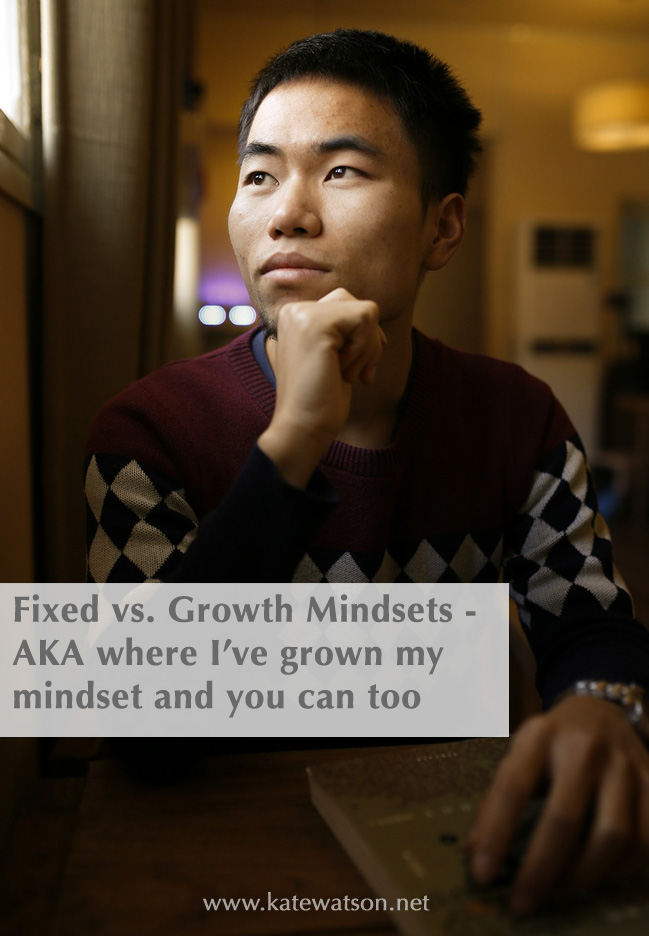
“It’s startling to see the degree to which people with the fixed mindset do not believe in effort.” – Carol Dweck, PhD, in Mindset: The New Psychology of Success
After writing about ease and the limits of having a fixed mindset, I realized I had a little bit more to say about fixed vs growth mindsets, particularly that you don’t necessarily have the same mindset across all of your belief systems. More on that in a minute.
First, to recap, “In a fixed mindset students believe their basic abilities, their intelligence, their talents, are just fixed traits. They have a certain amount and that’s that, and then their goal becomes to look smart all the time and never look dumb.
“In a growth mindset students understand that their talents and abilities can be developed through effort, good teaching and persistence. They don’t necessarily think everyone’s the same or anyone can be Einstein, but they believe everyone can get smarter if they work at it,” Stanford psychology professor Carol Dweck, PhD, explains.
To extrapolate a fixed mindset beyond intelligence:
- Athletes with fixed mindsets tend to practice less and rely on their innate talent more,
- People who believe personality traits are fixed may believe that a relationship must be perfect or it’s irreparably broken, and
- Business leaders with fixed mindsets tend to trust their own experience and knowledge instead of asking questions and seeking solutions from colleagues and subordinates.
Damning, isn’t it? Yet the worst finding is that, when people with a fixed mindset fail, they tend to give up completely, become embittered, and blame everyone else instead of picking themselves up, getting back in the saddle, and exploring a new path.
Therefore I was gratified to discover, during my read through Dweck’s book, that I had already cultivated a growth mindset in some areas.
Dweck says this is true for a lot of people. Even though we may have a fixed mindset about our intellect or sports ability doesn’t mean we couldn’t also think people change in their interpersonal relationships, for example.
I think this is important because it helps those of us who may tend toward a fixed mindset in one or more areas adopt a growth-minded orientation overall by recognizing and developing areas we’re already trending that way. Some of my growth-minded beliefs relate to:
- Personal Development: One of my strongest beliefs is that we all continue learning, changing, and growing over our lives. In fact, it was by taking responsibility for my own role in the demise of a six-year relationship that I was able to prepare myself to meet and accept the love of my life, to whom I’ve been happily married for almost 10 years now.
- Relationships: Because they’re created from individuals, relationships also must grow and change and, as a result, relationships require work. If I had a fixed mindset in this area, I might have thrown away my marriage when we met some hurdles instead of working to improve our communication and get back on the same page.
- Health: While I am not a natural athlete, I have felt drawn to jogging for more than 20 years, so I undertook a run/walk training program last year to complete my first 10k. I loved it!
- Business: When I was asked to take over a friend’s business in 2012, I first talked with every constituent to formulate a plan instead of assuming I knew how to fix everything right off the bat. I focused on the team and building consensus versus acting as a lone wolf, which is how leaders with fixed mindsets tend to do it.
- Intelligence: Now that I know about fixed vs growth mindsets and that my intelligence isn’t fixed, I’ve also started training my brain on Lumosity. It’s fun and, according to my upwardly trending LPI, I’m getting smarter every day.
Are there areas where you can admit to having a fixed mindset? After reading this post, do you have any new ideas to begin developing a growth mindset in that area? Tell me about it in the comments.
Cheers,

















